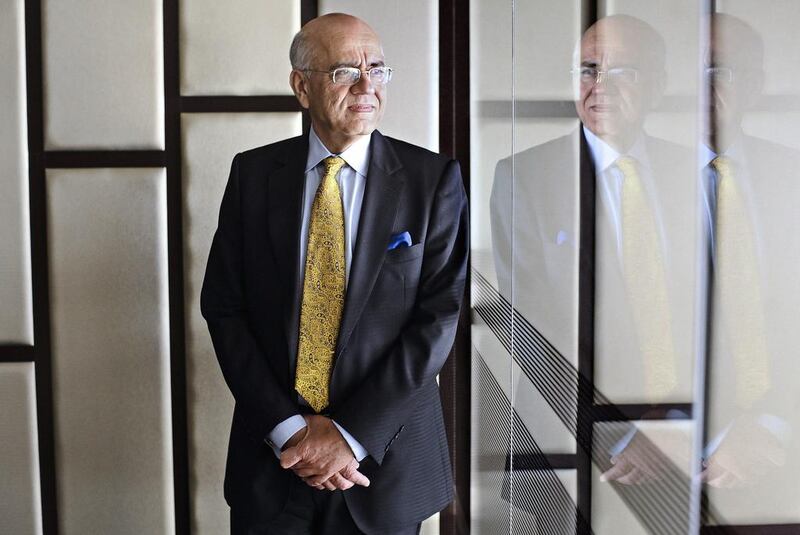Boosting productivity is the next big challenge for Gulf states accustomed to swapping oil wealth for industrial development, according to Masood Ahmed, the IMF’s chief economist for the Middle East.
"It is now increasingly urgent to focus on improving productivity," Mr Ahmed told The National. "A lot of the growth of Gulf countries has come from increasing the total amount of capital and labour" – that is, by hiring more expats and building new skyscrapers – "rather than increasing productivity.
“If you’re not going to be able to increase inputs in the same way in the future, then in order to generate similar levels of output and income growth, you’re going to have to generate higher productivity.”
Mr Ahmed, who studied at the London School of Economics, has been director of the Middle East at the IMF since 2008, in which time the region has weathered the Arab Spring, the financial crisis and a dramatic fall in oil prices that could eventually pose an existential threat to the political economy of the Gulf.
As dwindling oil revenues threaten the ability of Gulf states to swap underground resources for new bridges and teachers’ salaries, one policy solution is to eke more output and income out of every available drop of oil.
Studies from the Dubai Economic Council, and from researchers from the Institute for the Study of Labour, a German think-tank, indicate that total factor productivity – how economists measure the efficiency with which resources are used – has grown very slowly since the UAE’s founding. Growth has not come from using stuff more effectively – it has come from swapping oil for more stuff.
This needs to change for the UAE and other Gulf countries, if they are to prosper once the oil has run out. That means more and better education, increasing the emphasis placed on promoting innovation and entrepreneurship, and getting more women into work – themes that have been mentioned as part of the government's efforts to move towards a "knowledge-based economy".
“GCC states need to start looking at the effectiveness of money spent on education, and to think about ways you can get more output from it,” Mr Ahmed said. Gulf states spend enough money on education, and big chunks of the population are enrolled, he believes. But skill shortages among national populations remain, making drives to get nationals into the private sector less likely to succeed.
“Despite the region’s youthful population, you still have employers who say that they can’t easily find young people with the skills they need,” Mr Ahmed said.
This means that GCC states need to look at “whatever can be done to improve grades, competitiveness, and STEM [science, technology, engineering and mathematics] skills.”
The good news is that plenty of examples of successful education systems are available, shortening the time it will take the region to catch up to international peers.
“In education, the time it takes to move up the attainment ladder is getting shorter because of the faster exchange of experience between countries, driven by networks and technology,” Mr Ahmed said.
Programmes that partner enterprises with universities and schemes to provide financial support for university leavers can help get more young people into work, according to Mr Ahmed.
“But the challenge is how to learn from these successes and to scale up, in a way that will show large-scale results. That is where the focus ought to be,” he said.
Policies to boost female participation in the workplace would also help Arab economies to grow.
“In this region, female labour force participation is lower than in almost every other region in the world,” Mr Ahmed said.
“The gap between male-to-female labour force participation is three times higher than the gap you see in other emerging markets. If the gap was just twice as high, this would generate US$1 trillion of additional output over a decade. Even by the size of the Middle East’s economies, that is a substantial amount.”
But Gulf governments have made some progress on this front. “In the GCC and the UAE, enrolment by women in tertiary education, as well as a changes of rules that makes it easier for women to participate in the labour force, have helped the situation,” Mr Ahmed said.
In industrial policy, government attempts to encourage innovation and entrepreneurship, which aim to help new firms with clever new ways of doing things to emerge, meet with Mr Ahmed's approval.
“One of the things I’ve been impressed by is the discussion that is under way about how to move into innovation, and awareness of the impact innovation could have in changing the dynamics and nature of the UAE economy,” he said. “It’s along those lines – through encouraging innovation and entrepreneurship – that people in many countries people are moving to raise productivity and make economies better adapt themselves to trends in technology.”
abouyamourn@thenational.ae
Follow The National's Business section on Twitter





